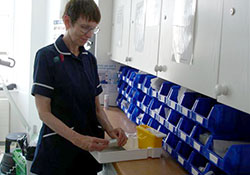Gay Lee is a ward sister in a hospice, caring for people at the end of their lives in London, United Kingdom

Gay Lee
"A peaceful death is a great achievement and something everyone should be entitled to. I used to be a midwife, and the two areas – palliative care and midwifery – have a lot of similarities in some ways. The idea is not to ‘cure’ someone, but to have a peaceful and simple birth or death, with dignity.
My ward has 8 beds, 3–4 staff on a shift and some volunteers and, even then, we are often hard pressed. Many of our patients depend on us for all their physical care; others need encouragement to remain independent. Relationships with patients and their families are often intense. Listening and talking are very important; we have to listen to be sure what the patient is ready to hear, and wants to know or to say. To do all this properly needs a lot of time and therefore staff.
Our hospice is a voluntary organization, but it is also part of the health system, since much of the funding comes from the National Health Service. The atmosphere here is very special. People used to think of hospices as places with no hope, but it is not like that: for a start, many of our patients come in and out of the place for months, sometimes years, and are based at home: we make it possible for them.
We work shifts and, for about two thirds of my time, I am in charge of the whole hospice with 17 beds in all, soon to increase to 28. I do a bit of everything, from giving drugs, coping with acute episodes of illness, sorting out supplies and solving management problems, to bathroom care and listening to and talking to patients and relatives. I don’t find it depressing, and the stresses for me are only about not having enough time. I would get much more anxious working with accidents and emergencies!
Palliative care is not rocket science. It is a very loving job to be doing; I think it’s fantastic. It is holistic, involving every aspect of the person and those close to them. There has been huge progress and great interest in end-of-life care in this country, and the field has been a medical specialty for over 20 years, but at the same time it is clear to me that there are no easy boundaries. Someone who is old and frail or has a chronic illness may have the same needs as someone with terminal cancer, but you should not have to be dying to get this kind of care.
I love the National Health Service. Overall I think it works well, and the principle that treatment is free at the point of need (paid for by taxation) is an essential part in its success. Once the finances become more complicated, the administration costs shoot up and the quality of care is less sure. At the moment there is a big debate about how to fund care for the large numbers of people growing old: people are living longer but not necessarily in good health. Because of the concern that this care might cost the taxpayer a lot, I have to prove that my patient is in need of ‘health care’ rather than ‘social care’, when there is little to distinguish them. This is because social care is means tested and many old people have to pay for it. We spend valuable hours filling in forms and working the system to benefit our patients. I actually think that most people would pay more tax if it meant they knew they could end their lives with dignity and comfort and symptom free, regardless of their age or condition."



